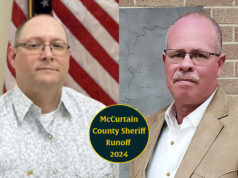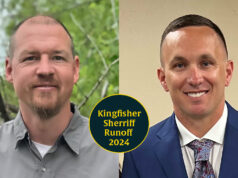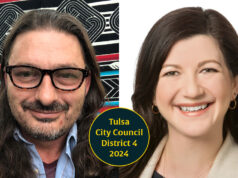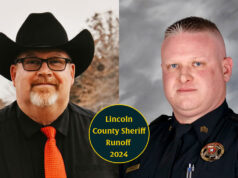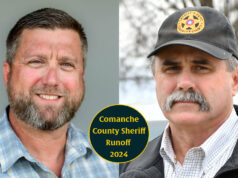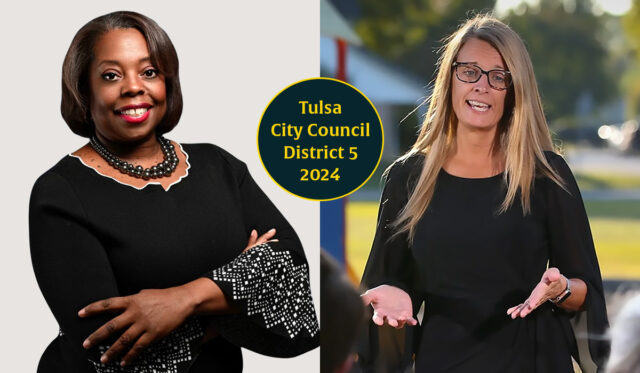

A former city councilor and the chairwoman of the Oklahoma Democratic Party are competing to succeed controversial Councilman Grant Miller in representing Tulsa City Council District 5. While Miller announced a reelection campaign for the Tuesday, Aug. 27, election, he opted not to file after the Tulsa County District Attorney’s Office brought and dropped a domestic violence charge against him.
Oklahoma Democratic Party Chairwoman Alicia Andrews, 53, said that feeling unrepresented in the district during Miller’s tenure on the council is part of her motivation for entering the race.
“I feel like we, at least for the last two years in my district, haven’t been represented fully. Our councilor had specific agendas I don’t think were necessarily reflective of our district,” Andrews said.
Former Councilwoman Karen Gilbert, 56, also said she felt unrepresented the last two years and said the district has struggled with stable representation since she left office.
“We definitely need stability in our district,” Gilbert said. “We have not had that since I left — and I’m not trying to sound conceited — but since I’ve left, every two years we’ve gotten a new councilor.”
With only two candidates seeking Tulsa City Council District 5 — a compact area covering Midtown Tulsa and some of its eastern portion — the winner of the Aug. 27 election between Andrews and Gilbert will earn the seat.
Tulsa City Council District 5 candidate backgrounds
Andrews, an alumna of East Central High School and the University of Oklahoma, is from Tulsa and worked as a consultant before starting her current career as a realtor. She has lived in Tulsa City Council District 5 for four years and previously lived in District 3.
She said she has volunteered for candidates for years, but never with any political party until the reelection of Republican Gov. Mary Fallin in 2014. After seeing an article on low voter participation in that election, she said she started getting involved in party politics.
Andrews became the secretary of the Tulsa County Democratic Party from 2017 to 2019 and has been the chairwoman of the Oklahoma Democratic Party since 2019. If elected to the Tulsa City Council, she said she intends to retain her position with the state party.
Gilbert is also from Tulsa and formerly represented the district from 2011 to 2018. After getting involved with her children’s PTA, Gilbert was elected president of their schools’ PTAs and later president of the Tulsa Council of PTAs.
In 2011, she made her first run for City Council, unseated incumbent Chris Trail and beat former Councilor Sam Roop, who had previously represented the district between 1996 and 2005. She was reelected without opposition in both 2014 and 2016.
She left the city council in 2018 to run for the Oklahoma House District 79 seat but lost in the Republican primary to Dan Hicks. In 2022, she lost the District 79 Republican primary to Paul Hassink. Both Hicks and Hassink lost to Rep. Melissa Provenzano (D-Tulsa). Since 2018, she has worked as the director of Tulsa Crime Stoppers.
Andrews is endorsed by Sally’s List and the local International Brotherhood of Electrical Workers, while Gilbert is endorsed by the Tulsa World, Tulsa Regional Chamber, Tulsa Firefighters PAC, Fraternal Order of Police, Tulsa Home Builders Association and the Association of Oklahoma General Contractors.
Candidates disagree on solutions for homelessness, public safety
Both candidates cited homelessness and public safety as some of the top issues facing the district, but they pointed to different ways to address the problems.
Andrews said the issues of homelessness and public safety “intersect” and that she fears the community is not having “intersectional conversations” that treat the issues as intertwined.
“I think we need to have difficult conversations,” Andrews said. “I think that there is a way to try and help people from getting homeless and trying to help the folks who are homeless because of a point-in-time incident, help them get out of that stage and then also keeping our community safe. You have to have both of those conversations at the same time.”
Gilbert pointed to State Questions 780 and 781 — a pair of criminal justice reforms that decreased the penalties for some crimes in the state — as part of Tulsa’s problem with homelessness and crime. She said she supported legislative action to roll back portions of the reforms.
“Of course, homelessness is a major concern for everybody throughout the city of Tulsa. Anytime I talk to residents, especially at the door, everyone’s concerned about crime,” Gilbert said. “But I think there also needs to be discussions with state representatives as well about crime. I do believe it was 780 or 781 that changed crime throughout the state of Oklahoma. (…) Now, drug offenses are a simple traffic violation, and that’s a frustration to a lot of residents.”
To address homelessness, Gilbert also suggested converting old hotels in the district into middle-income apartments to increase the district’s housing supply.
“I know there is a developer that has changed a couple of the hotels in the 34th and Memorial area into apartments for mid-income, so that’s happening in the district,” Gilbert said. “We don’t have anywhere else to build, so what can we do to convert and what can we do to solve that problem seems to be the million-dollar question.”
Andrews said increasing voter participation is one of her other top priorities, and she criticized Oklahoma’s current “one-party rule phase” as distracting from more serious policymaking.
“I think that doesn’t give us the best outcomes we can have for our citizenry,” Andrews said. “When one side isn’t really concerned with governing, they don’t have to be. I guess it was cute, it was fun, but the hunting Bigfoot law? There was no harm in that bill, but in my brain I’m thinking about, ‘We have hungry children, we have people who are still on their boil bans.’ We have real issues, and people are wasting their bills on hunting Bigfoot.”
Andrews also criticized electoral issues with the 2022 election that she said “robbed” citizens of a chance to vote, so she said she filed for Tulsa City Council District 5 to give voters a choice in the upcoming election. (In a subsequent lawsuit over Tulsa’s 2022 municipal election, then-Presiding Judge Doug Drummond acknowledged that up to 35 voters may not have received a municipal ballot, but he held it was still possible to determine the results “with mathematical certainty,” which left Miller leading by 27 votes.)
“The way [Miller’s] election went down frustrated me to no end in that not everybody in the district got a City Council ballot. (…) My big issue is voter participation, which includes ballot access, and I feel like folks in my district were robbed of an opportunity to participate in that election,” Andrews said. “If I hadn’t joined the race, our district would not have elected our person this time either. I think our district should have the opportunity to select their representation.”
Gilbert also said that increasing communication with constituents is a priority, and she identified filling the mostly vacant Promenade Mall as another one.
“[Communication] was my major focus when I was on the council the first time, like I told you. Bringing that sense of community back together within the district, trying to fill the void of economic development in our district,” Gilbert said. “We have a lot of vacant buildings. One of the major ones is the Promenade there at 41st and Yale. That’s smack-dab in the middle of the city, and it sits there vacant — the mall at least.”
Gilbert appears to back city’s tribal suits, Andrews wants to change course
Because the 2020 U.S. Supreme Court decision in McGirt v. Oklahoma decision functionally upheld the eastern half of Oklahoma as a series of Indian reservations, Tulsa is the largest city in the United States to fall almost entirely within Indian Country. The current mayoral administration is engaged in at least two separate lawsuits over Tulsa’s decision to continue exercising criminal jurisdiction over tribal citizens in municipal court.
Asked her stance on the mayoral administration’s position in the lawsuits, Gilbert initially said it was the mayor’s role to set the city’s legal policy.
“I don’t feel that I’m in a place where I should tell municipal courts what to do and what not to do. We’re all citizens of Tulsa, we’re all citizens of Oklahoma. There is no reason we cannot all work together,” Gilbert said. “As a councilor, you don’t get to tell the departments, the entities, what to do. That’s the CEO’s job as mayor.”
Asked to clarify her stance, Gilbert said, “We’re all citizens, I don’t feel like it should be in a separate court.”
Andrews said the city should “stop” fighting in the litigation.
“What is happening in our state and local government with regards to tribal citizens is deliberate and divisive. Let’s just follow the law, and what I believe they’re doing is not following the law,” Andrews said. “McGirt is the law of the land. Stop.”
Past partisanship looms as candidates seek to settle Tulsa’s swing district
Since Gilbert left office, no councilor has held District 5 for more than a single two-year term, and the district has swung between electing conservative and liberal councilors.
Cass Fahler, a Republican, was elected to replace Gilbert but lost his 2020 reelection campaign to MyKey Arthrell, a Democrat. In turn, Arthrell lost his first reelection campaign to Miller, who was registered as a Libertarian at the time.
With Miller choosing not to run this year, District 5 residents find themselves again selecting a new councilor. Complicating the race is each candidate’s partisan baggage and the political swing of the district. While officially nonpartisan, most voters in the district will be aware of the candidates’ party affiliations.
Asked what she tells Democratic voters after her two Republican runs for the Oklahoma House, Gilbert said she is not running a partisan race and that she has experience representing the district as a nonpartisan.
“My race is strictly nonpartisan. Even though I am a Republican, I’m not knocking on doors introducing myself as, ‘Hi, I’m Karen Gilbert, I’m a Republican running for Tulsa City Council,'” Gilbert said. “I’m Karen Gilbert, and I’m talking about exactly what we’ve been talking about: the priorities of the district. And asking each resident, ‘What are your concerns?'”
Gilbert said she “had no intention of ever running” for office again but was approached about running by a group of residents who organize in the private Facebook group “The D5 Alliance.”
“I did not file because I think that the city should have a tighter budget. I did not file to run because of Republican ways or being against Democratic ways,” Gilbert said. “I filed because residents — a large group of residents — had asked me to run. And that large group of residents are a good mix of independents, Republicans and Democrats.”
Asked what she tells Republican voters about being the chairwoman of the Oklahoma Democratic Party, Andrews said the City Council “for the most part” sets aside partisanship and that she would do the same if elected.
“I’m running for the betterment of Tulsa, and this office is a nonpartisan race. Now, everybody who sits on that City Council is registered to vote, and they’re all registered to vote one way,” Andrews said. “For the most part, they’re able to put their labels aside and do what’s right for Tulsa, and I want to be a part of that team.”
Asked whether she was concerned about running a campaign while chairing a state party during an election year and missing the week before the municipal election to attend the Democratic National Convention, Andrews said she was concerned about missing the time campaigning but said, “The calendar is the calendar.”
“I believe most of our City Council also have jobs,” Andrews said. “I don’t see this as anything different. I have a job, and I have to do my job. Does that mean I care less about my city? No, I live here, and I ran for the state chair from Tulsa on purpose. There were huge calls for me to move to Oklahoma City, but this is where I live.”








